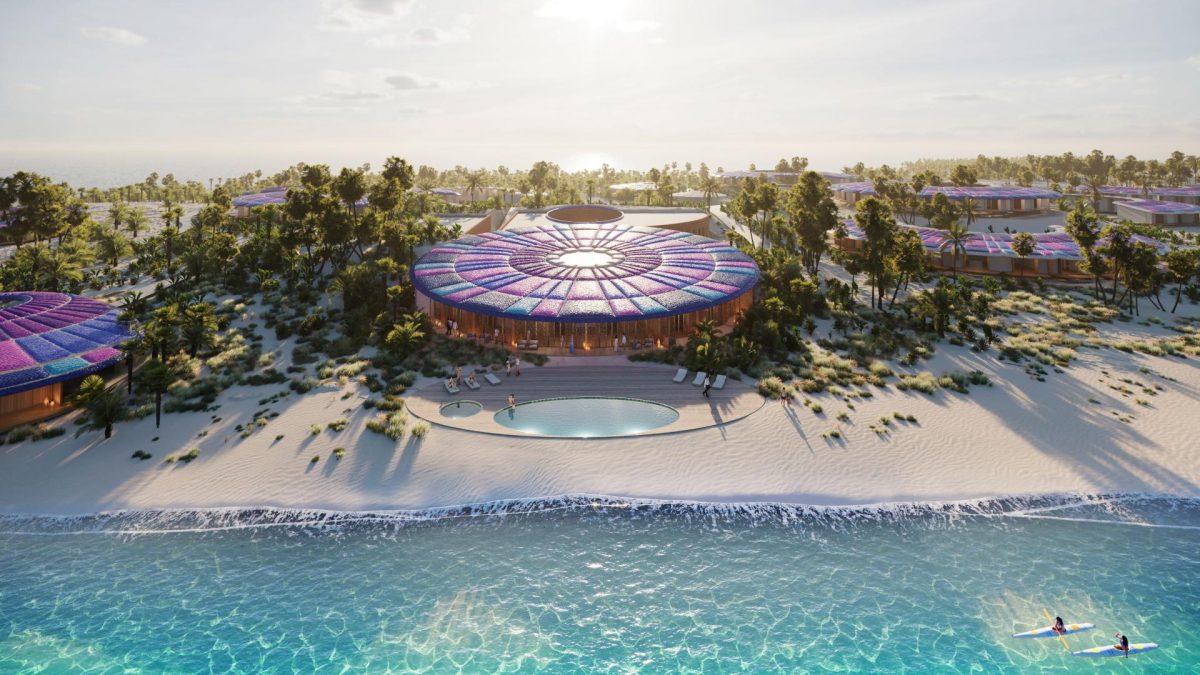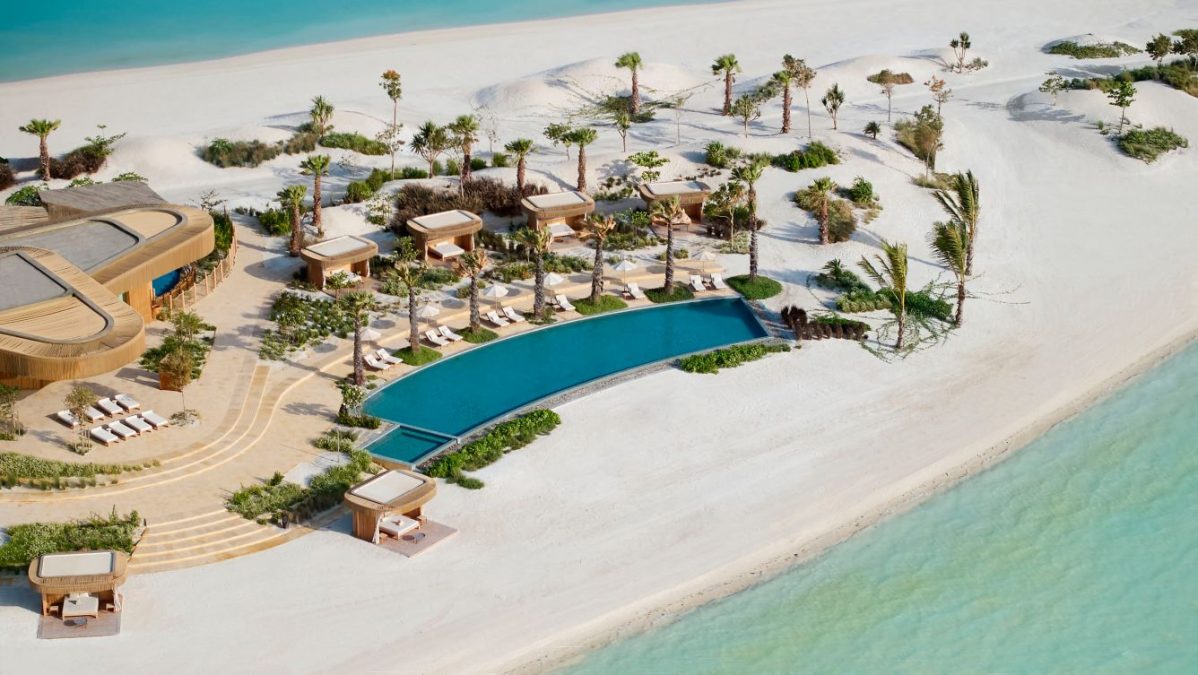At a time when global tourism is undergoing a rapid shift, Saudi Arabia stands out as a symbol of both transformation and opportunity. Aradhana Khowala, Chair of the Group Advisory Board at Red Sea Global and CEO & Founder of Aptamind Partners, provides TRENDS with an exclusive glimpse into the future of the tourism and hospitality industries in the GCC and the broader Middle East.
Khowala offers a unique perspective on how Saudi Arabia is reshaping the tourism industry, setting new standards for luxury and sustainability, and redefining its role on the global stage.
She provides unparalleled insights into Red Sea Global’ s groundbreaking projects and the Kingdom’s ambitious goals, discussing how Saudi Arabia is not only following in the footsteps of established destinations such as Dubai, but also forging its own extraordinary path.
Her perspective sheds light on Red Sea Global’ s significant milestones, the transformative impact of local engagement in hospitality, and the unique experiences that visitors can expect.
As the region faces geopolitical challenges and a rapidly changing global landscape, Khowala’s vision provides hope and a roadmap for using tourism to promote unity and positive change.
Q. How do you see the future of the tourism and hospitality industry of the GCC and the wider Middle East?
A. The Middle East is home to two of the world’s most vibrant and rapidly expanding tourism markets, UAE and Saudi Arabia. Both countries are setting remarkable benchmarks not only in terms of visitor numbers but also in the economic value generated. The region is on track to break global records, with revenue soaring by approximately 50% and the travel and tourism sector’s contribution to GDP increasing by 25%. So, travel isn’t just back in the Middle East and GCC countries; it’s booming and spreading in Bahrain, Egypt, Kuwait, Qatar, and Oman. The region is exceptionally well-positioned for continued growth moving forward.
Q. Do you think Saudi Arabia is the new Dubai, when it comes to the development of the tourism industry?
A. I don’t believe in comparing destinations against each other, so my honest answer would be no. Saudi Arabia isn’t trying to become the next Dubai. But the real question is, why should it aim to be? Dubai is a well-established global destination with a long history of attracting visitors from around the world. People come to Dubai because it’s safe, culturally rich, offers great food, world-class hotels, and a vibrant arts scene. Dubai has had a 30-year head start, so it’s not fair to draw direct comparisons with Saudi Arabia, which, until six years ago in 2018, saw 98% of its tourism driven only by religious visits.

Rather than compare, it’s important to recognize the scale of Saudi Arabia’s ambitions and the extraordinary progress made in such a short time. Additionally, when considering the region’s broader context, including the macroeconomic indicators, the young population, and the growing wealth and influence, it’s clear that both Dubai and Saudi Arabia play crucial roles. Thus, it’s not about one becoming the other; both are essential to the region’s future. Does that make sense?
Q. How do you view Saudi Arabia’s positioning as the next-level luxury tourism destination?
A. The UN Tourism report for 2023 highlighted Saudi Arabia as the top destination for international tourist arrivals last year, surpassing 2019 levels and pre-COVID. What’s even more impressive is the forecasted growth, with tourism expected to increase by an average of 11% annually over the next decade. Last year, Saudi Arabia celebrated its 100 millionth visitor, surpassing its target by seven years. The new goal is to reach 150 million visitors by 2030, and I have no doubt they’ll achieve this ahead of schedule.
In recent years, Saudi Arabia has invested $800 billion in tourism, and just in the first six months of 2024, the country welcomed 60 million tourists, with travel and tourism contributing 5% to the global economy. I’m extremely optimistic about the future of Saudi tourism, especially considering the consistent excellence they’ve demonstrated over the past 6-7 years. It’s a brilliant example of what can be achieved when financial resources and political will align, it’s truly magical.
What I find particularly admirable is Saudi Arabia’s commitment to authenticity. The outdated model of importing cheap labor from poorer countries is no longer sustainable, and the Ministry of Tourism has focused on empowering local Saudis. About 100,000 locals have been trained abroad, and it’s incredibly encouraging to see so many, especially women, taking on leadership roles in the tourism sector, an industry that was historically not even accessible to locals. This progress is enormously inspiring.
Q. Can you share some of Red Sea Global’ s most significant milestones over the past seven years? How do these accomplishments compare to the initial vision?
A. When I first visited the Red Sea Global site, it was vast stretches of nothingness, untouched, brimming with diverse, yet eerily undeveloped and empty. To be honest, I couldn’t imagine what it could become. But today, I’m speaking to you from the Ritz Reserve, where three hotels are now operational. It’s surreal to return to the same site and see so many architecturally distinctive, visually striking buildings that are all iconic, and all fully functional.
What truly amazes me, though, is that nature remains the priority here. The environment is undisturbed and protected, which is amazing.

Red Sea Global isn’t just building structures; it’s transforming the entire Red Sea Coast. Full credit goes to CEO John Pagano, whose visionary leadership saw the potential to create something magical and extraordinary in a place where others might not have. He will undoubtedly be remembered as one of the key figures who transformed this coastline.
This project is a prime example of how the world changes, one landmark project at a time. Change doesn’t come from conventional solutions; it comes from groundbreaking, inspiring approaches. It doesn’t happen through empty promises, but through bold breakthroughs and gig commitments. And Red Sea Global has delivered on everything that once existed only on paper. I couldn’t be prouder.
Q. Could you walk us through the transformation from the early stages of the project to the current state?
A. I’m at the Ritz Reserve, and I believe it offers a truly unique and delicate blend of the five elements of nature and authentic Saudi culture. This essence is infused in every detail, from the prayer beads on the table to the intricate designs on the chest of drawers, to the food, the cultural touches, and the butlers who serves each villa. The experience is fantastic. The traditional welcome with dates and mangoes from nearby home lodges adds an extra layer of authenticity that I find absolutely fascinating.
Q. What distinguishes Ritz Carlton Reserve from the other hotels within the Red Sea Global?
A. When we talk about stunning hotels, they all stand out with their iconic architecture and visually striking designs. However, what sets this hotel apart is something truly special, it’s not just a property; it’s a seamless fusion of nature and culture in every aspect around you. Take, for instance, the ropes used to clad the exterior, reminiscent of the traditional fishing boats from this region. Guests are invited to participate in planting mangroves, with 600,000 already replanted. This makes you an active participant in co-creating a future and diversity that benefits both people and the planet.
What I find particularly extraordinary is the hotel’s emphasis on social responsibility. This is more than just another hotel; it’s about building and nurturing a thriving community that contributes to the well-being of everyone involved—not just the visitors, but, importantly, those who work here. That focus on the people who live and work here, putting them first, is the right approach. You can feel it not only in the way this hotel operates but in how the entire project is embraced and cherished by the community.
Q. How is Red Sea Global redefining modern architecture and development in Saudi Arabia, and what sets its projects apart from traditional approaches?
A. Everywhere you look, there’s a clear emphasis on high-end, architecturally distinctive buildings that are individually iconic and visually striking. Red Sea Global is obviously setting a new standard for modern architecture in Saudi Arabia, with cutting-edge design being a core element of every hotel here. What I especially love is that each resort is unique and memorable, challenging the traditional concept of what a hotel should be. None of these buildings are simple, utilitarian structures; each one stands out on its own.
Another aspect that truly distinguishes Red Sea Global and its developments is the strong focus on sustainability. While sustainability has now become mainstream, Red Sea Global was one of the early adopters of truly sustainable building practices six or seven years ago. They didn’t just change the rules; they set new standards for the travel and tourism industry to follow.
Finally, their commitment to social responsibility is remarkable. They are deeply committed in creating spaces that benefit the community and contribute to Saudi Arabia’s broader economic and social fabric, whether through job creation, infrastructure development, or stimulating economic growth. Red Sea Global is more than just a large master-planned community or a giga project; it’s transforming the Kingdom and its people by providing them with a vision and a sense of pride like never before.
Q. Red Sea Global has made strides in involving locals in the workforce. How has this approach influenced the development and operations of the project?
A, Nearly 50% of those involved with Red Sea Global are locals, which highlights an important shift from the old model of relying on imported, inexpensive labor, a model that is no longer sustainable. Authentic service delivery, in my opinion, must be led by locals who not only embody the culture but also celebrate it. Saudi culture and hospitality are unique assets that simply cannot be replicated. The Saudi sense of hospitality is unparalleled, even in a region known for its high standards. Red Sea Global does a fantastic job of making locals the true stars of their projects. These developments are built for, led by, and meant to serve the local community.
Q. What unique experiences does the project offer, and how do they align with Red Sea Global’ s vision?
A. Let me give you an example: When Red Sea Global made the decision to go completely off-grid and power not just their hotels but the entire destination with solar renewable energy, it was seen as a bold, and crazy move, perhaps even overly ambitious at the time. But now, look at the impact it has and what it could mean for the world at large. Often, people, businesses, and even entire industries are waiting for someone to take the first step so they can copy it. This is how society progresses collectively: someone must take the lead, be the pioneer, and then others replicate that success.
Red Sea Global has done exactly that, they’ve shown that there’s a different way to achieve success, one that prioritizes sustainability and community while still being profitable. This shift in mindset is what truly sets Red Sea Global apart. It’s no wonder the project is so deeply loved and embraced by the community.
Q. As a tourist visiting Red Sea Global, what unique experiences can I expect?
A. At Red Sea Global, each hotel offers a distinct experience, especially here at the Ritz Reserve. For instance, stargazing is a major attraction, there is a telescope in the room and a resident astronomer guiding guests on nightly stargazing journeys. You can also explore the mangroves on foot, even at night. Remarkably, this destination is the only one in the world that is fully accessible to everyone, regardless of physical ability. Whether you’re visually impaired or use a wheelchair, you can still enjoy activities like snorkeling or diving. The inclusivity here ensures that every visitor, no matter their physical abilities, can fully engage with the diverse range of land and sea activities. There are countless unique experiences waiting for you, it’s something you truly have to experience.
Q. The Middle East region has been plagued with geopolitical tensions. How does this impact tourism?
A. I believe the impact will be broad, not just for Saudi Arabia but for the entire region. It’s crucial to remember that, as we speak, there are many conflicts occurring around the world. This presents a huge opportunity for the travel and tourism industry to step up as a force for peace and a catalyst for positive change. Travel fosters connections and understanding, once you experience a destination, it’s difficult to hate it or its people.
Tourism needs to move beyond the mindset of passively observing global issues and instead actively consider its role in the industry. We should ask ourselves how we can be agents of change and contribute to uniting the world. Travel and tourism have a unique power to bring people together, and there are few industries capable of fostering such connections.
Q. What would be your advice to tourism stakeholders to minimize the impact of global events such as Covid-19?
A. Any destination must integrate resilience and crisis management as fundamental elements of their strategy. The tourism sector has proven its resilience over centuries, becoming adept at handling various challenges. However, emerging destinations should prioritize building tourism resilience into their strategic planning. With future pandemics and increasing geopolitical tensions, having resilience as a core component is essential.
Moreover, instead of remaining passive, the tourism industry should actively engage as a problem-solver. We need to move beyond merely observing global events and take a proactive stance in addressing issues. Tourism has the potential to significantly contribute to biodiversityIt’s time for the industry to transition from a passive role to an active one, demonstrating how it can make a meaningful impact.








